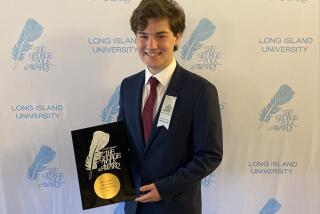Ex-CEO Is Accused of Insider Trading
- Share via
NEW YORK — The former chief executive of biotechnology company ImClone Systems Inc. was arrested early Wednesday on charges of violating insider-trading laws--marking the most prominent such case in years and further sullying corporate America’s image.
Samuel Waksal, 54, who stepped down last month amid deepening questions about his family’s trading of ImClone stock, was accused of tipping off two relatives to impending bad news about the company’s top drug prospect.
Waksal was arrested at his loft in Manhattan’s SoHo neighborhood at 6:30 a.m. by FBI agents. He was later freed on a $10-million bond, co-signed by Harlan Waksal, his brother, who succeeded him as ImClone’s CEO.
The arrest came a day before a scheduled congressional subcommittee hearing on alleged insider trading at ImClone, in particular by Samuel Waksal. A subcommittee of the House Energy and Commerce Committee also will look into stock trading by Harlan Waksal, a spokesman for the committee said Wednesday.
In a complaint filed by the U.S. attorney’s office in Manhattan, prosecutors allege that Samuel Waksal got word of an adverse decision by the Food and Drug Administration about the company’s experimental cancer drug Erbitux. He allegedly leaked the information to two people--not named in the complaint--who immediately sold shares that were worth $10.5 million.
Samuel Waksal tried to sell almost 80,000 of his ImClone shares but was blocked by two brokerage firms that demanded the company’s approval, the complaint alleges.
The controversy surrounding Waksal includes businesswoman Martha Stewart, a close friend of his.
Stewart sold almost 4,000 ImClone shares the day before the FDA announcement, but she maintained Wednesday that she had no privileged information and did nothing wrong. Stewart was not charged in the U.S. attorney’s complaint and was not identified by the committee as a focus of its investigation.
The charges are the latest in a series of disturbing events involving corporate America and some of its most visible executives.
Last week, L. Dennis Kozlowski, the former chief executive of conglomerate Tyco International, was charged with evading sales taxes. That followed mounting financial scandals at companies such as Enron Corp. and Global Crossing Ltd., as well as broad criticism of Wall Street stock analysts.
Whereas recent instances of wrongdoing centered on alleged accounting and corporate financial chicanery, the cases involving Tyco and ImClone have top executives accused of pursuing their own financial well-being at the expense of taxpayers or shareholders.
ImClone was the toast of the biotechnology industry a year ago, based on expectations surrounding Erbitux, a colon cancer drug. To celebrate the drug’s potential, the Waksals threw a party at an industry conference last spring at which revelers were entertained by the Doobie Brothers. The company predicted that Erbitux would reach the market this year and have sales of $1.5 billion by 2005--a prospect that today appears highly unlikely.
The scandals have taken a toll on the stock market, with the current downturn blamed partly on investor distrust of large companies. Some experts fear that such sentiment could dent the fledgling economic recovery.
“The significance of this case was that Samuel Waksal was a CEO of a public company and he held a very powerful position, and he exploited this position,” said Helene T. Glotzer, assistant regional director of the New York office of the Securities and Exchange Commission, which filed parallel civil charges against Waksal. “I don’t think there’s much more that can undermine investor confidence than conduct like this.”
Samuel Waksal was charged with six counts of securities fraud, two counts of conspiracy to commit securities fraud and one count of perjury for allegedly lying to SEC investigators.
If convicted, Waksal would face a maximum of 10 years in prison for each of the securities fraud counts and five years each for the conspiracy and perjury counts. He also could be liable for monetary penalties.
Attorneys Mark Pomerantz and Lewis Liman said in a statement that the evidence against their client was “entirely circumstantial.”
“The government misread that evidence and it overreacted in deciding to make today’s arrest,” the statement said. Waksal “looks forward to the opportunity to defend” himself.
Under terms of his release, Waksal’s travel is restricted to portions of New York state. By Friday, he must put up $5 million in cash and get signatures from two people willing to co-sign the bond. Prosecutors alleged in their complaint that Waksal had more than $80 million in debts and owed payments of more than $800,000 a month.
U.S. Magistrate Frank Maas in New York signed a waiver Wednesday evening allowing Waksal to travel to Washington to testify at today’s hearing. The Justice Department sought the waiver at the behest of the committee, chaired by W.J. “Billy” Tauzin (R-La.).
A spokesman for the committee said that if Waksal failed to attend, he would be held in contempt of Congress. But Scott Tagliarino, a spokesman for Waksal, said the former chief executive planned to appear.
Also expected to appear were Harlan Waksal and Brian Markison, a vice president of Bristol-Myers Squibb Co., the big drug maker that invested $2 billion in ImClone last fall to acquire marketing rights to Erbitux.
A source close to the Waksal family said attorneys for Samuel Waksal had discussed a voluntary surrender to the Justice Department and had no indication, until his arrest, that it had been ruled out.
The complaint alleges that Samuel Waksal learned Dec. 26 that the FDA would soon notify the New York-based company that it would refuse to consider ImClone’s application to market Erbitux.
That night, the complaint says, Waksal tipped off the first person, who sold 135,000 shares during the next two days. On the morning of Dec. 27, Waksal allegedly informed the second person, who promptly sold 39,472 ImClone shares.
The FDA faxed ImClone a letter rejecting the company’s request about 4 p.m. Dec. 28, the SEC complaint says. ImClone announced the news at 6 p.m. By the end of the next trading day, its shares had sunk 16% from $55.25 to $46.46 on Nasdaq. They closed Wednesday at $7.83, up 28 cents.
Meanwhile, Tauzin’s committee is reviewing evidence that Harlan Waksal sold 700,000 shares at $72 each--or about $50 million--of ImClone stock Dec. 6, two days after learning from an employee that the FDA might reject the company’s Erbitux application.
Committee spokesman Ken Johnson said that on Dec. 4, Lily Lee, ImClone vice president of regulatory affairs, met with FDA officials to discuss the company’s application to market the cancer drug. At some point in the meeting, Johnson said, Lee got “bad vibes” and asked whether the FDA planned to reject the company’s application to market the drug.
An FDA official told Lee that such an outcome was possible, and Lee passed that information on to Harlan Waksal, Johnson said.
Johnson said the sequence of events “raises serious questions” about what Harlan Waksal knew and whether it affected his decision to sell ImClone stock.
Harlan Waksal was unavailable for comment Wednesday. His attorney, Carl H. Loewenson Jr., had no comment on the details of the allegation.
But he said: “Harlan Waksal has testified at the SEC and answered all of their questions. He has not received a Wells notice, and he will answer all questions put to him by the subcommittee.”
A Wells notice is a document from the SEC that informs targets that the agency plans to file a lawsuit against it.
A person familiar with the investigation said a rejection was one of three outcomes described to Lee at the Dec. 4 meeting with the FDA. According to the source, the agency told Lee that the application otherwise could be accepted or delayed.
“It is like coming to a stoplight,” the source said. “It can be red, green or yellow.”
The timing of Harlan Waksal’s stock sale was coincidental, said a source familiar with the situation. Harlan Waksal told the company’s board of directors in a memo Oct. 31 that he planned to sell a large block of shares to pay taxes. He had incurred a large tax bill by exercising options earlier in the year and by selling a large number of shares to Bristol-Myers when the company bought its 20% stake in ImClone.
The sale was delayed until Dec. 6 by several factors, the source said.
Times staff writer Abigail Goldman in Los Angeles contributed to this report.
More to Read
Inside the business of entertainment
The Wide Shot brings you news, analysis and insights on everything from streaming wars to production — and what it all means for the future.
You may occasionally receive promotional content from the Los Angeles Times.










